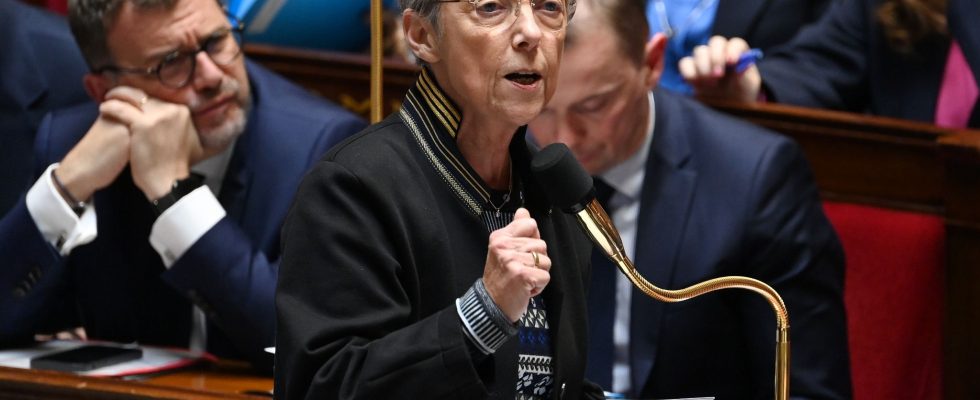“Everyone slanders me/Except the mute, that goes without saying…” Like the non-conformism of Brassens’ song, 49.3 has a bad reputation. One example among others: in 2016, the citizen movement “Nuit Debout”, created in protest against the Labor law, denounces in its use a “denial of democracy”. The opposition to this article, which allows the government to engage its responsibility on a bill – which is considered adopted if a motion of censure is not voted in the National Assembly -, today seems widely shared . In an Odoxa-Backbone study for Le Figaro, 74% of respondents consider its use unacceptable to pass the pension reform. “Citizens see it as a very undemocratic mechanism, which brutalizes parliamentary life”, notes Bruno Cautrès, CNRS researcher at Cevipof. So that the executive seems to favor a vote of the deputies, with the result however uncertain.
Its use dates back to the second term of François Mitterrand, who has a relative majority in the Assembly. François Mitterrand’s former Prime Minister Michel Rocard (1988-1981) used it twenty-eight times, a record. Edith Cresson, his short-lived successor to Matignon (1991-1992), uses it eight times in less than a year. “There was a big tension at the time of Edith Cresson. The singers called it 49.3”, recalls Gaspard Gantzer, former adviser to François Hollande and author ofAre you still on the left? (Flammarion, 2022).
Ambivalences
In 2008, Nicolas Sarkozy’s constitutional reform limited its use to a single text per parliamentary session, excluding finance bills or Social Security financing bills. At the time, its abolition was even mentioned, but the political configuration (an absolute majority for the right) made its use unlikely. Moreover, the memory of Michel Rocard, saved by this article when he only had a relative majority, encourages us to keep it, as the lawyer Anne Levade reminds us in the columns of South West.
The Holland five-year term (2012-2017), during which Manuel Valls uses it six times, notably for the Macron law (2015) then the Labor law (2016), constitutes a turning point. “The situation twisted at that time, testifies Jean-Christophe Cambadélis, first secretary of the Socialist Party from 2014 to 2017. The application of 49.3 by the left against the left [les frondeurs, NDLR] was felt hard. Including by Emmanuel Macron…” Gaspard Gantzer completes: “There was an alignment between the personality of Manuel Valls, very divisive, and the use of 49.3, a legal instrument which was put at the service of this personality. to be branded by this article, Manuel Valls, candidate for the primary of the left in 2016, will propose the deletion – an about-face which did not bring him luck, since he will finish in third place in the ballot…
Examples that bear witness to the left’s ambivalence towards 49.3. If its parliamentary tradition incites it to mistrust, unlike a right concerned with the primacy of the executive over the legislature, this reluctance often fades in the test of power. “In France, the left is less often in power than the right, and when it is, it often has majority problems,” recalls Gaspard Gantzer.
Political circumstances
According to Stéphane Rozès, the political scientist and author of Chaos – Essay on the imagination of peoples (with Arnaud Benedetti, editions of Cerf, 2022), “what matters to the French is not whether the executive should force the legislature, but whether it does so for legitimate reasons. In the spirit of citizens, when France mastered its national sovereignty, it was a tool at the service of the executive to advance parliamentary work. But since the executive is no longer for them the emanation of the popular will , they see it as a means of pushing through structural reforms imposed from outside”.
In other words, the perception of 49.3 depends first of all on the political circumstances and the nature of the project carried out by the government. Hence the relative leniency enjoyed by Michel Rocard in his time, in the consensual context of “united France”. – François Mitterrand’s campaign slogan for his re-election to the Elysée…
Meaning of institutions
But at a time of aspiration to direct democracy, its use may seem anachronistic, which no doubt explains the reluctance towards it from Emmanuel Macron, who would prefer to avoid using it for pension reform. “The Fifth Republic is tired, the citizens recognize themselves less in rigid and authoritarian institutions. If the government does not have a majority, I do not see why it would have the upper hand over Parliament”, analyzes Gaspard Gantzer. Political scientist Gérard Grunberg, former member of Michel Rocard’s cabinet, is exasperated by criticism of “a fundamental element of the 1958 Constitution, which Michel Debré [son principal inspirateur avec le général de Gaulle, NDLR] considered to be of a parliamentary nature. If you don’t have a majority to overthrow the government, there’s no reason the prime minister can’t get his bills through.”
Will the feud continue for long? The EELV deputy Jérémie Iordanoff tabled, Thursday, March 9, a constitutional bill to delete the hated article, which would harm the “credibility of the democratic system as a whole”. Will his withdrawal be included in the institutional reform announced by Emmanuel Macron? Pending a possible retouching of the Constitution, the 49.3 has not finished dragging its bad reputation.
